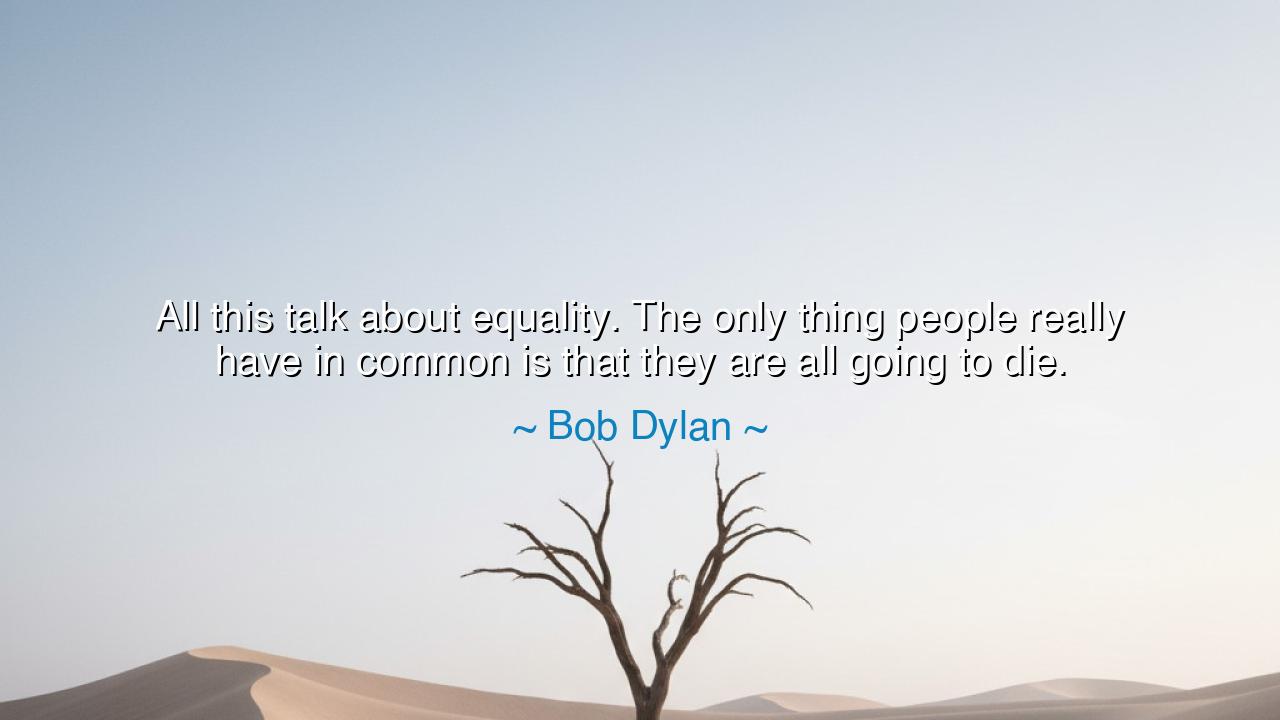
All this talk about equality. The only thing people really have
All this talk about equality. The only thing people really have in common is that they are all going to die.






“All this talk about equality. The only thing people really have in common is that they are all going to die.” Thus spoke Bob Dylan, the wandering poet of a restless age, whose voice carried both the music of rebellion and the silence of truth. Beneath his words lies not cynicism, but clarity—a reminder of the fragile thread that binds all of humankind. Dylan’s wisdom pierces the illusions of the modern world, where men speak endlessly of equality, yet fail to grasp the one equality that none can escape: the equality of mortality. For in death, all crowns are laid down, all debts are forgiven, and all masks fall away. Kings and beggars, saints and sinners—all return to the same dust from which they were formed.
In the days of the ancients, philosophers meditated upon death not as an end, but as the great equalizer—the force that humbles the proud and comforts the oppressed. Dylan, with the tongue of a prophet cloaked in a minstrel’s song, reminds us of this eternal truth. Humanity’s obsession with equality often concerns wealth, power, or status. Yet these are shadows, fleeting and false. The rich may dine from silver plates, and the poor from clay, but the grave hungers for both alike. In the end, the same darkness closes over every eye, and the same silence swallows every voice. Thus, Dylan’s words call us not to despair, but to humility, to recognize that the one bond we share is not our possessions, but our mortality.
Consider the story of Alexander the Great, who conquered empires and stretched his dominion across continents. When death came for him at the height of his glory, he commanded that his hands be left outside his coffin, that the world might see that even the conqueror of nations could carry nothing beyond the grave. In that simple gesture, he proclaimed the same truth that Dylan later sang: that all men, regardless of triumph or tragedy, are equal before the final silence. Death strips away illusion—it does not ask one’s lineage, nor care for one’s wealth. It is the ultimate measure of our humanity.
But Dylan’s quote is not only about death—it is also about life. For when we remember our shared mortality, we learn how to live with compassion and humility. The man who knows he will die does not waste his days in envy or pride; he cherishes each moment as a gift, and each person as a mirror of his own impermanence. When we forget that truth, we become arrogant, dividing ourselves by race, class, or creed, as though we were gods destined to endure forever. Yet death whispers to each of us alike: “You are no more than the dust you walk upon, and no less than the stars you gaze upon.”
The ancients called this wisdom memento mori—“remember that you must die.” To them, this was not a curse but a liberation. For if all are equal in death, then no man has cause to exalt himself above another, and no man has reason to despair. Death makes mockery of vanity, but it also makes holiness of humility. It teaches that greatness lies not in conquest, but in kindness; not in superiority, but in service. When Dylan said that death is our only true equality, he was, in his own way, urging mankind to stop chasing false ideals and start seeking the truth that lives within each fleeting heartbeat.
Equality, then, is not found in what we own or how we are treated by society—it is found in the shared fragility of our existence. The farmer tilling his field, the artist painting her soul upon a canvas, the child laughing in the street—all are bound by the same fate, all are candles burning toward the same night. The question, then, is not whether we are equal, but whether we can live as though we are—knowing that our time is short, that every breath is borrowed, and that love is the only currency that death cannot claim.
The lesson, dear listener, is as stark as it is tender: remember your mortality, and let it teach you mercy. When you are tempted to scorn another, think of the grave that awaits you both. When pride swells within you, recall that the same earth that will cover the humble will one day cover the mighty. Let this awareness not fill you with fear, but with gratitude—with the courage to forgive, the wisdom to cherish, and the humility to serve. For when we remember that death unites us all, we begin, at last, to live as though we truly belong to one another.
So heed the words of Bob Dylan, that modern oracle of eternal truths. Forget not that equality is not granted by governments nor found in riches—it is written in the dust of our bones. Let death be your teacher, not your terror; let it guide you to live more kindly, more fiercely, more truthfully. For when the final song fades and silence falls upon all souls alike, the measure of your life will not be in what you possessed, but in how deeply you loved while the music still played.






AAdministratorAdministrator
Welcome, honored guests. Please leave a comment, we will respond soon